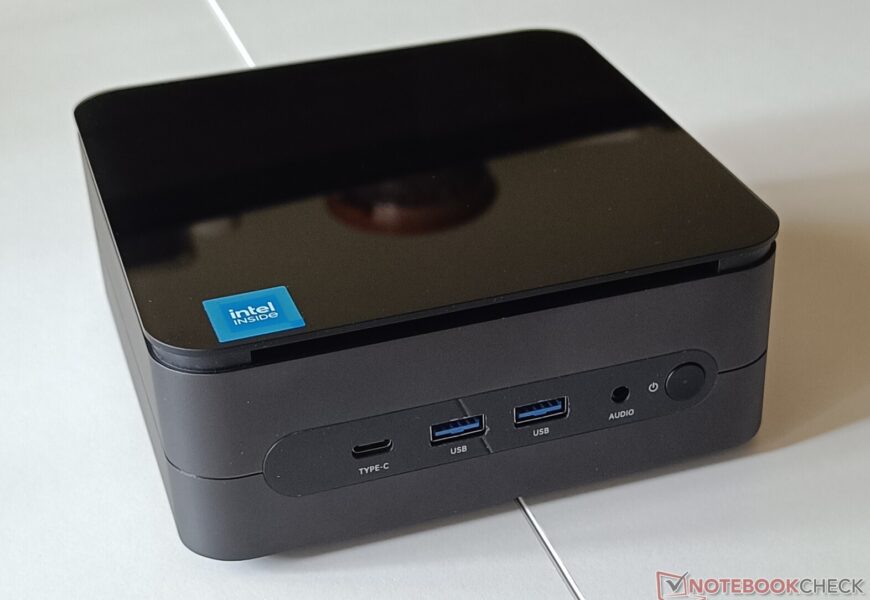Established in 2017 in Dover, Delaware, USA, AcePC Electronics LLC is a comprehensive business involved in product design, research and development, manufacturing, sales, and customer support. The company’s assembly facility in China focuses on creating a diverse range of compact devices distributed globally. One of their recent products is the AcePC Wizbox AI, which boasts Intel’s state-of-the-art Core Ultra processors. As the competition heats up, models featuring Meteor Lake will vie for performance dominance against compact PCs equipped with AMD’s Phoenix and Hawk Point APUs.
The AcePC Wizbox AI stands out with its larger and heavier chassis, measuring 147 x 147 x 55.55 mm (5.79 x 5.79 x 2.19 inches) compared to similar mini PCs. Sporting a simple design, the silver chassis is complemented by sturdy plastic top and bottom covers. This model comes exclusively in a dark color, offering users the option of a matte or glossy top finish. Weighing 840 g (1.85 lbs.) without the included 120 W power supply, this unit provides a solid build.
With its expanded size and higher price tag, one might expect a wider array of ports. The front panel hosts two USB-A 3.2 5.5 Gbps ports, two USB-C 3.2 10 Mbps ports, and an audio jack. On the rear, there are two additional USB-A 3.2 5 Gbps ports, two HDMI 2.1 video outputs, a 2.5 GbE port, and a standard Kensington lock slot. While lacking Thunderbolt 4 support, this setup meets the essential criteria for Meteor Lake devices. However, there is room for improvement in this aspect compared to rivals like the Minisforum EliteMini UM780 XTX, which offers dual 2.5 GbE ports, USB4 connectivity, and a more diverse selection of video outputs at a lower cost.
In the realm of wired connections, AcePC incorporates a Realtek RTL8125 NIC, a popular choice in this price range. On the wireless side, the AcePC impresses with its inclusion of a Wi-Fi 7 + Bluetooth 5.4 solution utilizing an Intel Wi-Fi 7 BE200 card, introduced in Q3 of the previous year. Noteworthy is the Wizbox Ai’s distinction as one of the initial devices to feature this rapid wireless solution. Intel’s Wi-Fi 7 BE200 supports TX/RX streams of up to 320 MHz, operates across 2.4 / 5 / 6 GHz bands, and achieves transfer speeds of up to 5.8 Gbps. Although Windows 11 does not yet support Wi-Fi 7, testing has shown impressive Wi-Fi 6E speeds.
The AcePC Wizbox AI demonstrates slightly better performance on the 6E 5 GHz band compared to the Minisforum UM780 XTX, though it falls behind the Intel NUC 13 Pro by 40%. Notably, the AcePC Wizbox AI surpasses the NUC 13 Pro by approximately 10% on the 6 GHz band.
In addition to the power cable provided with the power supply unit, AcePC includes several accessories with the mini PC, such as a USB-A to USB-A cable and a VESA mount with screws for wall or monitor mounting.
The bottom of the unit features an integrated fan for cooling the SSDs and RAM modules, accessible by simply removing the rubber feet and detaching the bottom lid. While our review unit came with one M.2 2280 SSD, an additional M.2 slot supports capacities of up to 4 TB. With support for new 48 GB DDR5 modules, the RAM capacity can be expanded to 96 GB. Unfortunately, accessing the CPU cooler requires removing the top lid, which may not be user-friendly.
This model comes with a 24-month global warranty and a 30-day return policy for dissatisfied customers, offering a full refund.
AcePC offers options for Core Ultra 5 125H and Core Ultra 7 155H processors from Intel’s latest Meteor Lake lineup. A comparison with AMD’s Phoenix models is warranted due to the incorporation of an NPU for AI tasks and a more potent iGPU in these processors. The Core Ultra 7 155H, which powers the reviewed AcePC unit, represents the mid-range model in the lineup. Test results were compared with AMD’s Ryzen 7 7840HS and Intel’s previous-gen i7-1360P to assess performance differences. Additionally, models featuring Ryzen 7 7735HS and Core i7-13700H processors were included for further analysis. The configuration included a 512 GB PCIe 4.0 NVMe SSD and 32 GB of Kingston’s DDR5-4800 RAM.
The mini PC exclusively utilizes a “balanced” power plan throughout the test suite, maintaining default power limits and TDPs without additional energy-saving adjustments. The Core Ultra 7 155H processor combines 8 efficiency cores, 2 low-power cores, and 2 additional low-power cores with a maximum frequency of 3. GHz. Hyperthreading is limited to the performance cores, resulting in a total thread count of 22. The processor also integrates an 8-core iGPU based on the Arc Alchemist architecture, supporting speeds up to 2.3 GHz, along with an AI Boost NPU clocked at 1.4 GHz.
Evaluation of CPU synthetic benchmark results on the Core Ultra 7 155H processor reveals significant multi-core performance improvements compared to the previous Raptor Lake iteration at a similar TDP. However, single-core performance shows mixed outcomes, with instances where the i7-1360P outperforms Meteor Lake in Cinebench R20. Notably, Meteor Lake falls short of surpassing Raptor Lake in any single-core test. In contrast, AMD’s Phoenix demonstrates commendable multi-core performance and competitive single-core capabilities.
The Meteor Lake chip excels in office and web applications, showcasing overall enhancements compared to the preceding Raptor Lake variant, though it slightly trails AMD’s Phoenix APU. While the Core Ultra 7 155H achieves top scores in cross-responsiveness and digital content creation tests for PCMark 10, it still lags behind Phoenix and Raptor Lake models.
The Intel Core Ultra 7 155H exhibits exceptional latency values, surpassing previous models and rivaling AMD’s Phoenix APUs. Notably, 4K YouTube video playback experiences fewer dropped frames compared to AMD’s Phoenix APU, with the i7-1360P leading in this aspect.
The Rayson NVMe SSD included with the unit demonstrates subpar performance compared to established brands like Kingston and Samsung, showing over 30% lower speeds on average. Thermal throttling, likely due to the PCIe 4.0 controller, contributes to performance fluctuations, with temperatures reaching up to 91°C during stress tests. While the unit features a dedicated fan for SSD and RAM cooling, thermal management could be improved with additional measures like thermal pads.
The 8-core Arc iGPU, based on Intel’s Xe LPG architecture, delivers competitive performance in synthetic tests, nearly matching AMD’s Radeon 780M. Despite slight performance differences favoring AMD in most scenarios, the Meteor Lake 8-core iGPU demonstrates significant improvements over the Raptor Lake Iris Xe graphics on the NUC 13 Pro.
While the Arc iGPU outperforms the AMD Radeon 780M in synthetic benchmarks, gaming performance tells a different story due to compatibility issues arising from Intel’s recent entry into discrete GPUs. Consequently, the Arc iGPU lags behind the AMD counterpart in gaming scenarios, underscoring the need for further driver optimizations.
The AcePC Wizbox AI, powered by the Intel Core Ultra 7 155H processor, operates quietly during idle periods, with fan activity slightly increasing under moderate CPU loads. Remarkably, the unit maintains a quieter profile compared to competitors like the UM780 XTX and NUC 13 Pro. Temperature management is commendable, with the top cover registering temperatures around 40-62.2°C under varying load conditions. CPU package temperatures remain within acceptable limits, showcasing efficient cooling design.
While the CPU side experiences minor throttling during stress tests, the iGPU side encounters more pronounced throttling episodes, affecting performance consistency. Power consumption analysis reveals a slight increase in idle power draw compared to previous-gen models, with improved efficiency under maximum loads. However, the unit consumes more power in average load scenarios, prompting a closer look at power optimization.
In conclusion, AcePC’s implementation of the Intel Core Ultra 7 155H Meteor Lake processor on the Wizbox AI mini PC brings notable performance enhancements over previous Raptor Lake models. Key features such as the NPU for AI workloads and the Wi-Fi 7 + Bluetooth 5.4 integration position the unit as a strong contender in its category.
Despite its strengths, the AcePC Wizbox AI has limitations such as a modest port selection, reliance on a lesser-known SSD brand, and suboptimal DDR5 DIMM speeds. While thermal management is effective, further improvements may be needed to address temperature concerns. Additionally, enhancing power efficiency could align the unit more closely with offerings from competitors.
The AcePC Wizbox AI is available for purchase directly from AcePC’s website at a price of $1,199.99.










